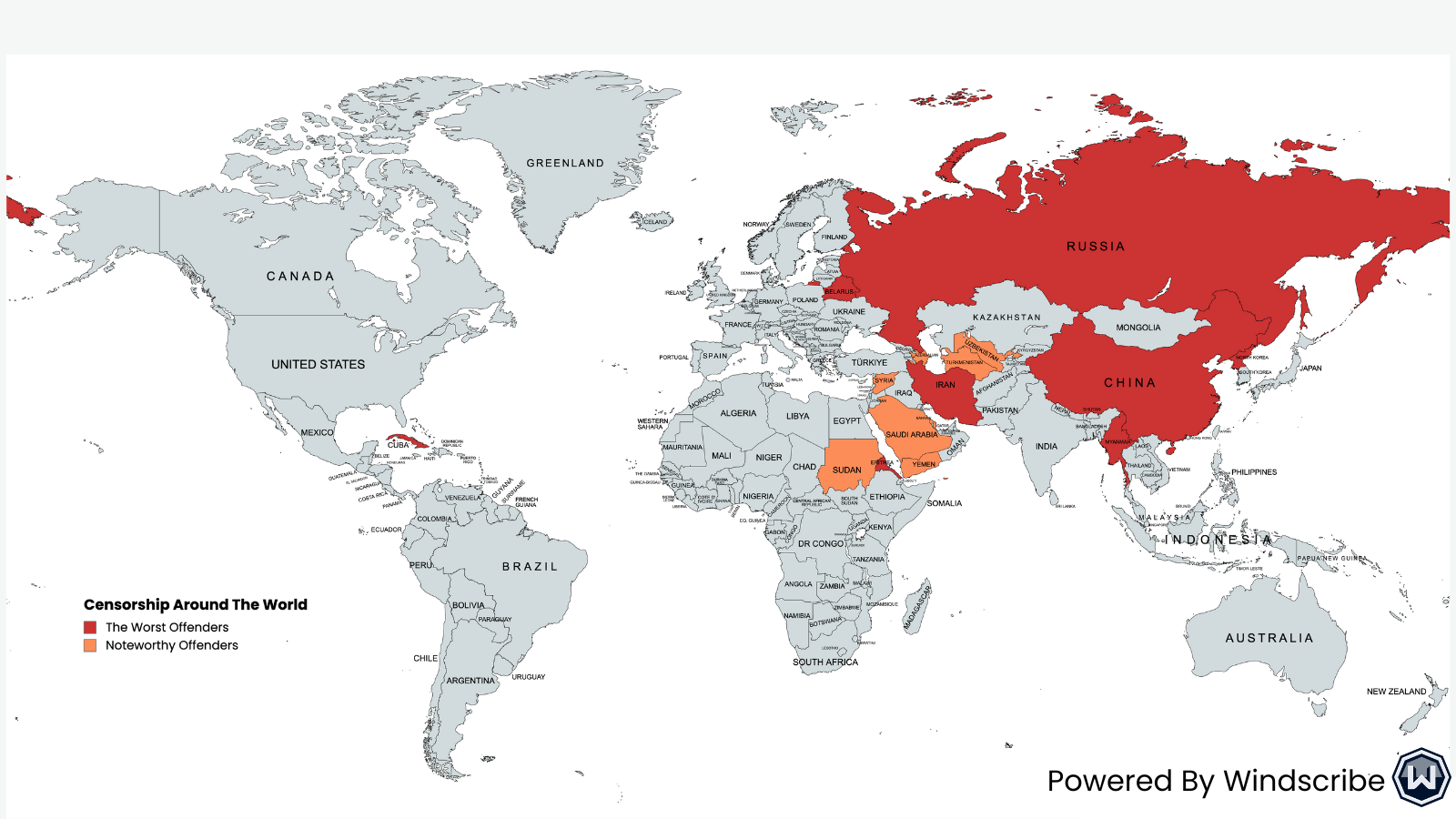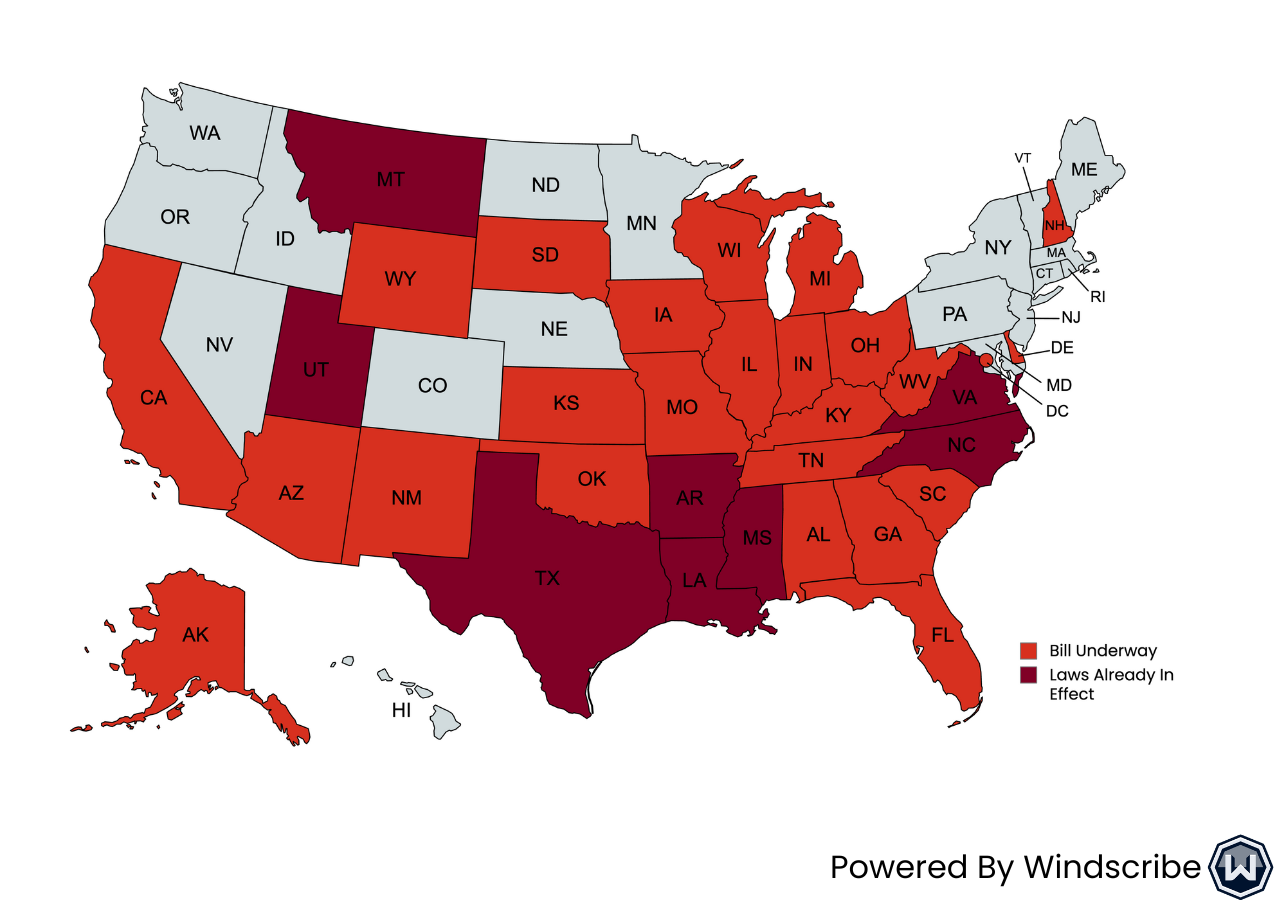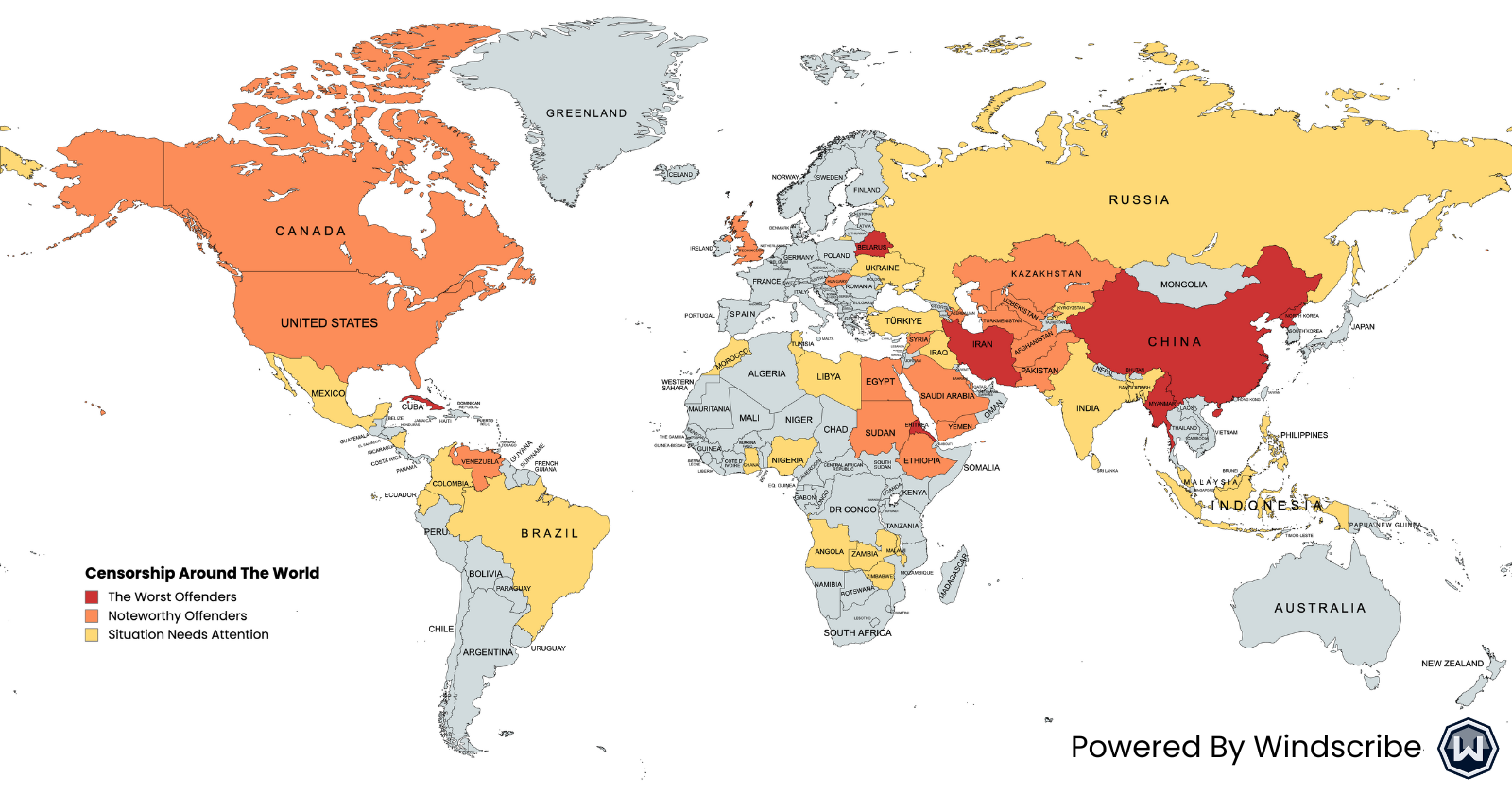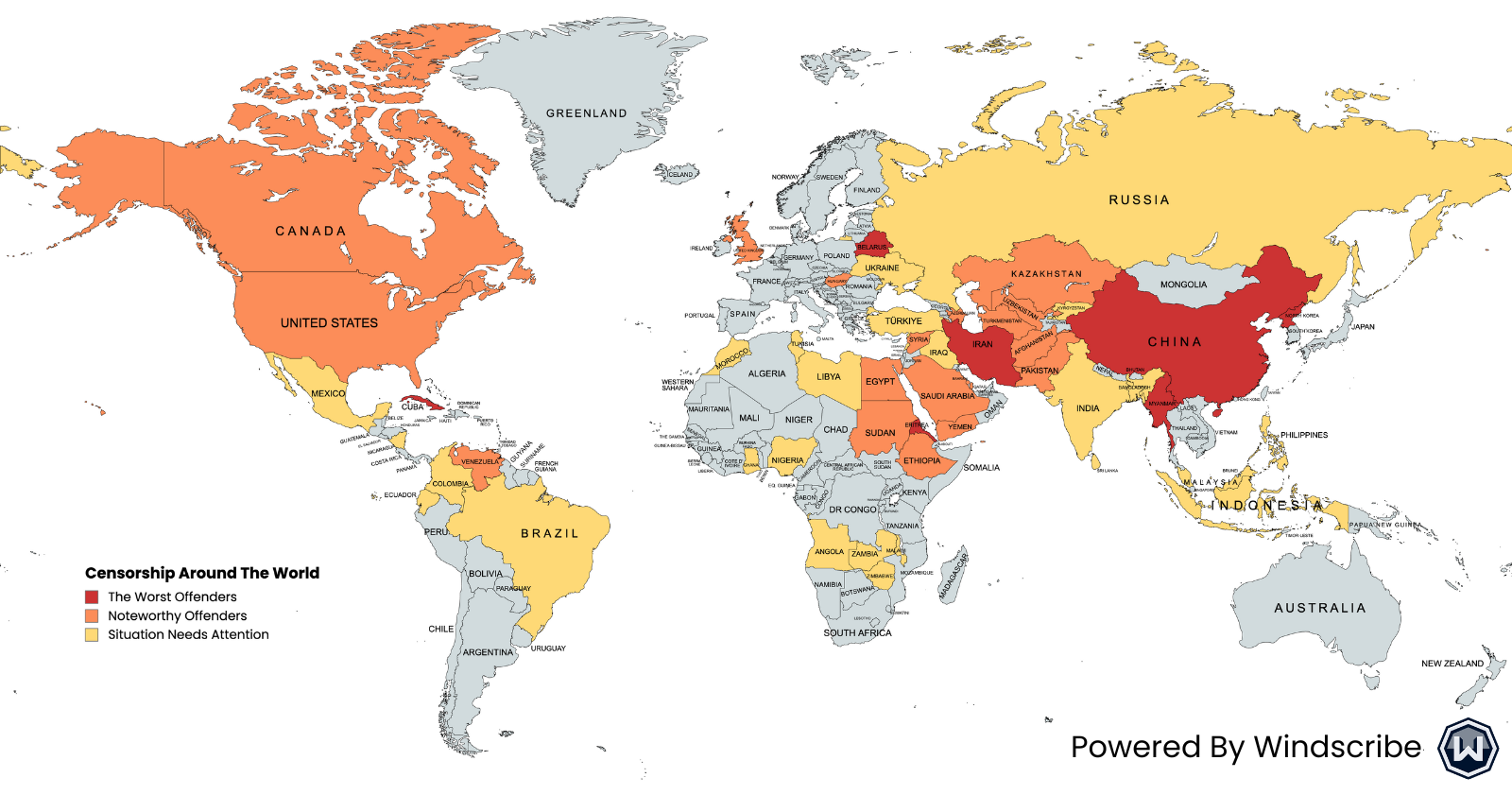Hello there, dearest Windscribbler, and welcome back to the internet blog where we like to talk about privacy stuff. Today we'll be focusing on the act of censorship, and how you as an individual can be a victim of it, sometimes unwittingly.
What Do We Mean by Censorship?
Under a very particular set of circumstances, censorship can actually be a good thing. Parents usually censor certain things from their young children to protect them. Courts censor sensitive information when it comes to certain types of cases. While these are simple examples, it's important to remember this distinction. The kind of censorship we're talking about is the one that your ISP, local school district, and federal government are guilty of.
We mean Censorship as the practice of actively restricting the flow of information, usually via means of the internet. There are a LOT of governments that are guilty of this, but right now we're going to focus on the worst offenders.
How Does Censorship Happen?
The Freedom House keeps track of this sort of thing using what's called the Freedom on the Net index. It's a rating system designed to measure a country's internet freedom using three criteria:
Obstacles to Access
- This is a metric that assesses the barriers to access from an economic, infrastructure, and political context. This might also include a government decision to shut off connectivity or ban specific apps
Limits on Content
- This is a metric that examines the legal status of content. This also includes technical filtering, website blocking, and other forms of online censorship used by governments
Violations of User Rights
- This is a metric that assesses legal protections afforded to free expression and the restrictions placed upon them. This includes both legal and extralegal repercussions
Using these parameters, we can get a pretty good idea of how restrictive or open a national or regional government is to free-flowing information to its citizens. A leader in the category of free and open internet is Iceland, with 5 consecutive years on top of the internet freedom list.
Some Alarming Stats About Censorship Worldwide
Before we really start bringing the mood down, let's start with a positive statistic: Roughly 5 of the 8 billion people on Earth are connected to the internet. Just take a moment to consider what an absolutely bonkers feat this is, given the fact that the telephone is under 150 years old. We really are living in an era where technological advancements happen in the blink of an eye, and they seem to be speeding up.
Unfortunately, there are some more alarming facts to contend with:
- 78% of the 5 billion connected to the internet live in countries where individuals have been arrested or imprisoned for posting content that touched a nerve with their government
- 68% of those 5 billion connected humans live in countries where the government used paid trolls to manipulate online discussion.
- 66% of these people live in countries where websites hosting political, social, or religious content were blocked.
- Over half (54%) live in countries where social media access has been temporarily or permanently restricted
AI is Making Things Worse
Disinformation campaigns, incredibly accurate facial recognition, deepfakes, and more. All of these things already existed before generative AI took the world by storm in the past year. The combination of the two is what's really worrisome.
Imagine some of the most repressive regimes on the planet, armed with both the desire and capabilities to suppress any form of perceived dissidence with brutal methods. Are these the kind of people we want to have access to this incredibly powerful (and volatile) technology? We've already seen how influential coordinated social disinformation campaigns can be, in multiple political elections across the globe.
Some of the Worst Offenders
Based off of the Freedom of the Net metric, we'll be identifying and analyzing some of the worst offenders when it comes to internet censorship

China
Internet censorship in China is conducted under a multitude of laws and administrative regulations, with more than sixty regulations specifically directed at the Internet. The censorship regime in China is one of the strictest globally, led by the ruling Chinese Communist Party (CCP), aiming primarily to curtail political opposition and events unfavorable to the CCP.
The censorship infrastructure evolved in parallel with the growth of the internet in China, incorporating various measures like filtering and blocking content, while also imposing liabilities on private parties, controlling access, deploying internet "police," and "guiding" public opinion. Internet censorship and surveillance are tightly implemented, blocking access to many foreign social media platforms like Google, YouTube, Facebook, Instagram, and Twitter through the "Great Firewall of China."
In recent years, China has introduced new regulations to further control online content. For instance, as of January 2021, new restrictions on online self-publishing came into effect, requiring administrators of independently operated social media accounts to obtain a permit and refrain from commenting on a list of restricted topics. Additionally, social media and streaming platforms are required to obtain licenses and censor "harmful" information.
The government's censorship efforts are administered through multiple organs of both the CCP and the state. The Publicity Department of the CCP plays a significant role, issuing editorial guidelines for media nationwide and employing 'public sentiment analysts' to monitor online discussions. The Cyberspace Administration of China also monitors and censors internet-based media and speech, issuing guidelines to online platforms for controlling discourse.
Private enterprises also partake in censorship efforts. For example, WeChat, a popular messaging and social media platform, employs semi-automated methods to monitor content for politically sensitive material, blocking such material from reaching intended recipients. Other companies might contract censorship tasks to independent firms. These multifaceted censorship mechanisms contribute to China's status as one of the world's most severe abusers of internet freedom.
North Korea
Censorship practices in North Korea are among the most extreme in the entire world, tightly controlled by the ruling regime to maintain strict ideological conformity and suppress any form of dissent. Censorship in North Korea generally takes place in the following forms:
State-Controlled Media:
All forms of media are state-controlled in North Korea. The government ensures they adhere to the official propaganda line, which glorifies the ruling Kim dynasty and promotes the Juche ideology.
Limited Access to Information:
The North Korean government severely restricts access to foreign information and media. Foreign publications, websites, and broadcasting are prohibited, and unauthorized possession of such materials can lead to severe punishment.
Censorship of International Communication:
Citizens are prohibited from making contact with the world outside North Korea without government approval. Unauthorized communication with the outside world can result in severe consequences, including imprisonment in labor camps for you and your entire family.
Surveillance:
The government maintains an extensive surveillance network to monitor its citizens' activities, including their interactions and conversations. Citizens are encouraged to report on each other, fostering an atmosphere of fear and mistrust.
Punishment for Dissent:
Any form of dissent, criticism of the government, or expression of independent thought is met with severe punishment. This can range from imprisonment in harsh labor camps to execution, often extended to family members as well.
Limited Internet Access:
Internet access in North Korea is highly restricted and generally reserved for high-ranking government officials and select institutions. The general population has limited or no access to the global internet, and the government monitors all online activities closely.
Propaganda and Ideological Control:
The North Korean government uses propaganda extensively to shape the beliefs and attitudes of its citizens. This includes regular mass rallies, public executions, and the ubiquitous presence of state-sponsored imagery glorifying the ruling Kim family.
Cuba
Internet censorship in Cuba is heavily enforced through various mechanisms and laws. The state-controlled Internet Service Provider, ETECSA, monopolizes internet access in the country. Citizens are required to show ID cards to purchase WiFi access and login using their national ID numbers. Public, university, and cyber cafe computers have government-installed surveillance software known as Avila Link, which monitors internet traffic and captures user credentials. The government can obtain usernames and passwords through proxy servers and special monitoring software. Anonymity and encryption systems, including VPNs and Tor, are illegal in Cuba.
The legal framework supporting these censorship practices has been reinforced over time. In August 2021, the Cuban government introduced new regulations criminalizing the sharing of "false" and "offensive" information online, along with expanded powers to restrict online speech. Around the same time, tighter controls on social media were implemented, including a ban on publications that might damage "the country's prestige"
Following mass protests in July 2021, the Cuban government enacted its first cybersecurity law to curb the use of social media and the internet for activities perceived as hostile towards the state. This law forbids content defaming Cuba's constitutional, social, and economic rules, or inciting acts that could alter public order and categorizes the danger of cyberterrorism as "very high."
Moreover, recent legal changes have amplified the government's power to stifle freedom of expression and assembly, such as the new Criminal Code and telecommunications regulations, which further impose censorship and criminalize certain online content. These laws and regulations manifest the Cuban government's intent to control digital spaces, clamp down on dissent, and maintain political stability.
Eritrea
In Eritrea, internet censorship is enforced through various practices and laws that impede freedom of expression and access to information. There are several ways the government manages this:
Low Internet Penetration and Access Costs:
The internet penetration rate in Eritrea is exceedingly low, with around 1% of the population going online as of the data from 2012. Moreover, obtaining a mobile subscription, which could facilitate internet access, is costly, requiring at least US$4.
Self-Censorship:
Journalists and other media practitioners engage in self-censorship due to fear of government retaliation. Independent online media outlets do not exist in the country due to the low and unreliable internet penetration.
Legal Restrictions:
The law in Eritrea criminalizes libel as a misdemeanor, with prescribed punishments ranging from one to six months of imprisonment along with a fine. There's also a requirement for submitting documents, including books, to the government for approval before publication. The government also monitors some internet communications, including email.
International Surveillance Listings:
Eritrea has been listed under surveillance by Reporters Without Borders (RWB) in 2008, 2009, and from 2011 onwards due to its internet censorship and surveillance practices.
These restrictive practices and laws contribute to an environment where internet censorship is pervasive, inhibiting the growth of digital media and limiting the freedom of expression in Eritrea.
Russia
Internet censorship in Russia has been escalating over recent years, with a combination of laws and technological measures employed to control and monitor online content and communications. There are too many to keep track of at this rate, but here's a selection:
Blocking VPNs and Tor:
Russia has plans to block Virtual Private Networks (VPNs) from March 1, 2024. Efforts to block Tor and VPNs to a certain extent are facilitated by Russia's deep packet inspection (DPI) technology, which allows for monitoring and filtering of online traffic.
Wartime Censorship Laws:
During wartime, stricter censorship laws come into effect, with Russian courts handing out more jail sentences under these laws in 2023 compared to 2022.
Law to Isolate the Russian Internet (Runet):
A law enacted in November 2019, aims at isolating the Russian segment of the internet (Runet) from the global internet during crises or external attacks.
Legislation Penalizing Internet Platforms:
Federal Law N482-FZ penalizes internet platforms, including major social media platforms like YouTube, Facebook, and Twitter, for censoring Russian media.
Legislation targeting "Discrediting" and "Disseminating Falsehoods":
New legislative amendments propose harsher penalties for individuals found "discrediting" Russian individuals participating in the war against Ukraine or "disseminating falsehoods."
Fining Tech Companies:
Authorities have fined tech companies, including major social media platforms, for allegedly violating Russian internet laws.
Harnessing Digital Technology for Control:
Rights advocates claim that under President Vladimir Putin, digital technology has been harnessed to track, censor, and control the population.
Increased Military Censorship:
Recent legislative changes aim to further tighten military censorship, notably around the dissemination of opinions and assessments of military operations, even in the absence of martial law in Russia.
All of these laws and practices reflect a broader trend of increasing state control over the internet and digital communications in Russia, often justified on the grounds of national security, stability, or the protection of Russian interests against foreign interference.
Belarus
Internet censorship in Belarus has escalated over the years with the government enforcing stringent control over online content. Laws have been enacted requiring domestic and international websites to register with the Information Ministry or face blocks, and commercial websites to operate from within Belarus under a .by domain. Internet service providers and Wi-Fi hotspot operators are mandated to register all users and censor blacklisted websites.
The government, through state-owned Beltelecom, centralizes internet control, heavily regulating the telecommunications and media market. During significant political events, internet blocking and restrictions are intensified, often under claims of national security.
Myanmar
Internet censorship in Myanmar has been severe, especially following the military coup on February 1, 2021. The military government controls information flow, particularly targeting content related to religion, ethnicity, politics, and morality. Myanmar lacks legal protections for freedom of speech and press, reflected in its very low score of 9 out of 100 on the Global Freedom Index.
During and after the coup, the junta imposed internet blackouts nationwide, blocked social media, and targeted shutdowns in areas of opposition. Such measures aimed to stifle protests and restrict information dissemination. It was reported that the junta did not use an internet kill switch but caused significant internet outages, affecting various Internet Service Providers (ISPs) to different extents.
UN experts have criticized these actions as attempts to establish a "digital dictatorship," which includes internet shutdowns, online censorship, and surveillance.
The military has used laws such as Article 505 of the Myanmar Penal Code to arrest, detain, and imprison thousands of individuals, including for online activities. This has had a chilling effect on free expression and has been a tool for crackdowns on dissent.
Further, the military has ordered telecommunications companies to install intercept spyware, assuming control of major telecom firms, such as MPT and Mytel, while compelling foreign firms like Telenor to exit the market. Independent newspapers have been forced to cease publication, and journalists have been arrested for using terms like "junta" or "coup d'état," reflecting the extent of media control. Satellite television has also been banned, with claims that foreign broadcasts threaten state security, targeting independent and ethnic media, and imposing penalties for non-compliance.
There Are Others You May Not Have Considered
Governments in the Western Hemisphere love to virtue signal about the freedoms afforded to their citizens when the reality isn't much better for a lot of people living in Western Countries. While the United States Government is busy virtue signaling about freedoms and whatever other sound byte resonates with the voting base, they are also installing backdoors into almost everything, and keep the well-funded three-letter agencies busy at work spying on the entire population.
It's not just about the spying; there have been an alarming number of state-backed bills and laws in various stages of development that essentially legitimize censorship in the affected areas. It all started in Louisiana at the very beginning of 2023 when a law known as HB 142 came into effect. What's so special about this specific law you may wonder? The bill was passed under the guise of "protecting the children" from online pornography, but it included language that enabled a larger type of censorship (at a likely unconstitutional level). The original bill uses a lot of sexually descriptive language to define what type of content is considered harmful to minors. But they also left this extremely dubious and seemingly vague statement at the very end of their definitions. Let's break it down:
Considering that this type of bill explicitly gives a state government the power to have ISPs censor websites that aren't following ID verification guidelines. In other words, if there is something the state government doesn't like, they could theoretically classify it as "harmful to minors"
Since then, almost half of US states have created copycat bills (and many have already passed). In case you missed it, we did a deep dive with a Louisiana state representative about this very bill and the effect it might have if you want to check it out.

Things aren't looking much better across the Atlantic Ocean over in the UK either. With the recent Online Safety Bill's approval, end-to-end encryption's future is looking pretty bleak. In case you're unfamiliar, this all started back in 2016 with the appropriately nicknamed "Snoopers Charter." As usual, it is presented as something that will make the internet safer for all, but really it means we're going to gradually erode away at your civil liberties until you're not even sure what happened.
What the Map Should Really Look Like
Considering that mass surveillance in Western countries has essentially been normalized, we think they're just as deserving of a spot on this map. There are also numerous other countries and regions around the world that are actively censoring information from their populace. Keep an eye on this page as we continue to expand our knowledge base of censorship around the world.

How to Stay Safe If I Live in One of These Countries?
The reality is that people in almost every country in the world are being subjected to some sort of governmental or societal censorship over the information we see and receive. It can be incredibly overwhelming to figure out what steps you need to take to keep yourself safe online. Locking down your online presence is one of the main ingredients to maintain your own sanity. That's where Windscribe has done most of the heavy lifting: we've got you covered already.









